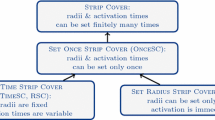Abstract
We introduce and study the Minimum Feasible Tileset problem: given a set of symbols and subsets of these symbols (scenarios), find a smallest possible number of pairs of symbols (tiles) such that each scenario can be formed by selecting at most one symbol from each tile. We show that this problem is \(\mathsf {APX}\)-hard and that it is \(\mathsf {NP}\)-hard even if each scenario contains at most three symbols. Our main result is a 4/3-approximation algorithm for the general case. In addition, we show that the Minimum Feasible Tileset problem is fixed-parameter tractable both when parameterized with the number of scenarios and with the number of symbols.



Similar content being viewed by others
Notes
Recall that \(\mathcal {O}^*\)-notation ignores factors that are polynomial in the input size.
A compression to \(\mathcal {O}(|F|^d)\) size can be achieved by specifying one bit for each possible scenario in \(\mathcal {S} \) and setting it to one if the scenario is present and zero otherwise.
Dell and Marx called this problem Perfect d-Set Matching.
References
Bansal, N., Caprara, A., Sviridenko, M.: A new approximation method for set covering problems, with applications to multidimensional bin packing. SIAM J. Comput. 39(4), 1256–1278 (2009)
Bezzo, N., Cortez, R.A., Fierro, R.: Exploiting heterogeneity in robotic networks. In: Redundancy in Robot Manipulators and Multi-Robot Systems. Lecture Notes in Electrical Engineering, vol. 57, pp. 53–75. Springer, Berlin, Heidelberg (2013). https://doi.org/10.1007/978-3-642-33971-4_4
Biedl, T., Chan, T., Ganjali, Y., Hajiaghayi, M., Wood, D.: Balanced vertex-orderings of graphs. Discrete Appl. Math. 148(1), 27–48 (2005)
Buchin, K., van Kreveld, M.J., Meijer, H., Speckmann, B., Verbeek, K.: On planar supports for hypergraphs. J. Graph Algorithms Appl. 15(4), 533–549 (2011)
Chen, J., Komusiewicz, C., Niedermeier, R., Sorge, M., Suchý, O., Weller, M.: Polynomial-time data reduction for the subset interconnection design problem. SIAM J. Discrete Math. 29(1), 1–25 (2015)
Crescenzi, P.: A short guide to approximation preserving reductions. In: Proceedings of the Twelfth Annual IEEE Conference on Computational Complexity (CCC)
Cygan., M.: Improved approximation for 3-dimensional matching via bounded pathwidth local search. In: Proceedings of the 54th Annual IEEE Symposium on Foundations of Computer Science (FOCS), pp. 509–518 (2013)
Dell, H., Marx, D.: Kernelization of packing problems. In: Proceedings of the 23rd Annual ACM-SIAM Symposium on Discrete Algorithms (SODA), pp. 68–81 (2012)
Dell, H., van Melkebeek, D.: Satisfiability allows no nontrivial sparsification unless the polynomial-time hierarchy collapses. J. ACM 61(4), 23:1–23:27 (2014)
Disser, Y., Kratsch, S., Sorge, M.: The minimum feasible tileset problem. In: Proceedings of the 12th Workshop on Approximation and Online Algorithms (WAOA ’14), LNCS, vol. 8952, pp. 144–155. Springer, Heidelberg (2014)
Disser, Y., Matuschke, J.: Degree-constrained orientations of embedded graphs. J. Comb. Optim. 31(2), 758–773 (2016)
Du, D.-Z., Miller, Z.: Matroids and subset interconnection design. SIAM J. Discrete Math. 1(4), 416–424 (1988)
Flum, J., Grohe, M.: Parameterized Complexity Theory. Springer, Berlin (2006)
Frank, A., Gyárfás, A.: How to orient the edges of a graph. Coll. Math. Soc. Janos Bolyai 18, 353–364 (1976)
Frank, A., Tardos, É.: An application of simultaneous diophantine approximation in combinatorial optimization. Combinatorica 7(1), 49–65 (1987)
Garey, M.R., Johnson, D.S.: Computers and Intractability. A Guide to the Theory of NP-Completeness. W.H Freeman and Company, San Francisco (1979)
Gottlob, G., Greco, G.: Decomposing combinatorial auctions and set packing problems. J. ACM 60(4), 24 (2013)
Hakimi, S.: On the degrees of the vertices of a directed graph. J. Frankl. Inst. 279(4), 290–308 (1965)
Johnson, D.S., Pollak, H.O.: Hypergraph planarity and the complexity of drawing Venn diagrams. J. Graph Theory 11(3), 309–325 (1987)
Kann, V.: Maximum bounded 3-dimensional matching is MAX SNP-complete. Inf. Process. Lett. 37(1), 27–35 (1991)
Kannan, R.: Minkowski’s convex body theorem and integer programming. Math. Oper. Res. 12, 415–440 (1987)
Koutis, I.: Faster algebraic algorithms for path and packing problems. In: Proceedings of the 35th International Colloquium on Automata (ICALP), pp. 575–586 (2008)
Lenstra, H.W.: Integer programming with a fixed number of variables. Math. Oper. Res. 8, 538–548 (1983)
Lundh, R., Karlsson, L., Saffiotti, A.: Autonomous functional configuration of a network robot system. Robot. Auton. Syst. 56(10), 819–830 (2008)
Marek, C., Fomin, F.V., Kowalik, Ł., Lokshtanov, D., Marx, D., Pilipczuk, M., Saurabh, S.: Parameterized Algorithms. Springer, Berlin (2015)
Mittal, S.: A survey of techniques for architecting and managing asymmetric multicore processors. ACM Comput. Surv. 48(3), 1–38 (2016)
Reinhard, D.: Graph Theory. Graduate Texts in Mathematics, vol. 173, 5th edn. Springer, Berlin (2016)
Rodney, G., Downey, R.G., Fellows, M.R.: Fundamentals of Parameterized Complexity. Texts in Computer Science. Springer, Berlin (2013)
Schuurman, P., Woeginger, G.J.: Approximation schemes—a tutorial. http://www.win.tue.nl/~gwoegi/papers/ptas.pdf
Sviridenko, M., Ward, J.: Large neighborhood local search for the maximum set packing problem. In: 40th International Colloquium on Automata, Languages, and Programming (ICALP), pp. 792–803 (2013)
van Bevern, R., Kanj, I., Komusiewicz, C., Niedermeier, R., Sorge,M.: Twins in subdivision drawings of hypergraphs. In: Proceedings of the 24th International Symposium on Graph Drawing & Network Visualization, LNCS, vol. 9801, pp. 67–80. Springer, Heidelberg (2016)
Author information
Authors and Affiliations
Corresponding author
Additional information
An extended abstract of this article appeared at the 12th Workshop on Approximation and Online Algorithms, Wrocław, September 2014 [10]. In comparison, apart from full proof details, the present article additionally contains examples and an APX-hardness proof. The authors gratefully acknowledge support by the Alexander von Humboldt-Foundation (Yann Disser), the ‘Excellence Initiative’ of the German Federal and State Governments and the Graduate School CE at TU Darmstadt (Yann Disser), the German Research Foundation (DFG), Projects KR 4286/1 (Stefan Kratsch) and NI 369/12 (Manuel Sorge), the Israel Science Foundation, Grant No. 551145/14 (Manuel Sorge), and the People Programme (Marie Curie Actions) of the European Union’s Seventh Framework Programme (FP7/2007-2013) under REA Grant Agreement Number 631163.11 (Manuel Sorge).
Rights and permissions
About this article
Cite this article
Disser, Y., Kratsch, S. & Sorge, M. The Minimum Feasible Tileset Problem. Algorithmica 81, 1126–1151 (2019). https://doi.org/10.1007/s00453-018-0460-3
Received:
Accepted:
Published:
Issue Date:
DOI: https://doi.org/10.1007/s00453-018-0460-3




